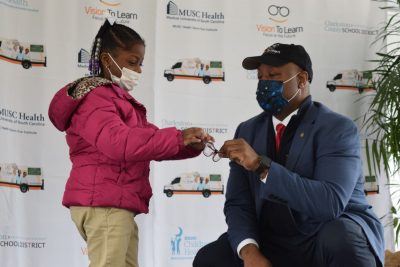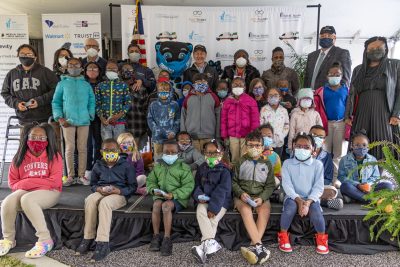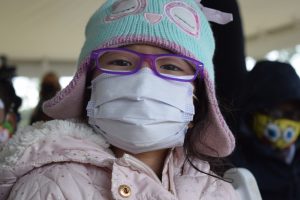U.S. Senator part of celebration to highlight Vision To Learn Charleston
January 10, 2022School-based vision health initiative will provide K-12 students throughout CCSD with free vision screenings, eye exams, and prescription glasses
Charleston County School District (CCSD) Board of Trustees and staff members joined U.S. Senator Tim Scott, City Charleston Mayor John Tecklenburg, and Vision To Learn Founder Austin Beutner at a celebration where 57 students at Stono Park Elementary School received new eyeglasses this morning. Stono Park is one of many schools in the district that are receiving or will receive school-based vision services through a collaboration between Vision To Learn, CCSD, and MUSC Health.
An estimated 10,000 children in Charleston County schools go to school every day without the glasses they need to see the board, read a book, or participate in class. Through this program, every student in CCSD will be provided a vision screening, eye exam, and – if needed – a pair of prescription glasses, free of charge, by Vision To Learn.
“At a time when our country is struggling to figure out what a just and equitable future should look like, this effort provides a good start,” said Austin Beutner, Founder and Chairman of Vision To Learn said. “Our mission is to make sure every child has the glasses they need to succeed in school and in life.”
Vision To Learn is a nonprofit organization with a mission to help kids in underserved communities get the glasses they need to see clearly at school. The program provides access to care to students on school campuses using a mobile vision clinic – an optometric office on wheels – staffed with licensed eye health professionals.
About one in four children, whether from a family with means or a family struggling to get by, will naturally need glasses. Children who need glasses and don’t have them are more likely to be misdiagnosed with behavioral issues in kindergarten, be considered “slow” learners by 5th grade, and to drop out of high school. Unfortunately, in low-income urban and rural communities, most children who need glasses don’t have them due to financial constraints, language barriers, unresponsive health bureaucracies or the simple fact there are no eye care professionals in their neighborhood. This program solves the problem by bringing the glasses to the kids where they are almost every day—their local neighborhood school.

Here’s how it works. Vision To Learn visits schools, where their staff teams up with classroom educators, school nurses and public health departments to make sure every child receives a vision screening. For children who don’t pass the screening, Vision To Learn vans, staffed with trained eye care professionals, visit schools to provide eye exams and glasses. All free of charge to the child and their family. Since launching in Charleston County School District this fall, Vision To Learn has provided over 800 eye exams and 670 glasses to students in nine schools.
Since launching in CCSD this fall, Vision To Learn has provided 810 eye exams and 670 glasses to students in nine schools.
Founded in 2012, Vision To Learn has screened over 1.2 million children, and provided over 320,000 eye exams and 257,000 glasses nationwide to students in 14 states and the District of Columbia.
Senator Scott helped students try on their glasses for the first time, to the applause of other students and school staff.
“I’ve often said education is the closest thing to magic,” said Senator Scott. “I can’t think of anything simpler than ensuring that kids are able to see what they are learning so the magic can happen. This remarkable program provides students with this critical tool for success and I’m proud to support it.”
“This is such an exciting day for these kids who, thanks to Vision To Learn, will be able to better understand their lessons and fully engage in the classroom,” added Mayor Tecklenburg. “Every student deserves the opportunity to succeed, and that begins with seeing clearly at school.”
This program is supported by Charleston County School District, which will ensure the service is communicated well and understood by families, offered first to schools with the greatest need, and closely integrated with the wealth of health and wellness services provided to students by CCSD.
“We are thrilled that Vision To Learn has partnered with our district at this time when school-based vision services are so desperately needed,” said Don Kennedy, Interim Superintendent of Schools. “The COVID pandemic has made it even tougher for students to access the regular eye check-ups they need, leaving many of our students with uncorrected vision issues. This program is a perfect fit to fill the gap.”

Vision To Learn’s program will help students in affiliation with MUSC Health, which provided capital funding for the mobile vision clinic, and offers additional choices to families for continuity of care, including specialized optometric and ophthalmologic care for students in need of more complex care following the initial “glasses” exam. As many as 20% of students who receive eye exams by Vision To Learn are likely to be referred for follow-up care to local community providers.
“The idea is to reach out to children who otherwise most likely would not receive any eye care to provide them with a screening examination and a pair of glasses free of charge to enhance their ability to learn,’” said Dr. Andrew Eiseman, Professor and Chair of the Storm Eye Institute. “MUSC, including our senior leadership, our children’s hospital, and the Storm Eye Institute all 100% agree with that philosophy.”
School-based vision care has never been more important. The pandemic widened preexisting opportunity and achievement gaps, hitting historically disadvantaged students hardest. Providing school-based vision services can help students to recover lost learning time and succeed as they return to in-person instruction. A groundbreaking study recently published in The Journal for the American Medical Association Ophthalmology by researchers from the Center for Research and Reform in Education and the Wilmer Eye Institute at Johns Hopkins University shows the impact of providing glasses to children at schools. The researchers conducted the largest and most rigorous study in the U.S. to measure the impact of providing eyeglasses to students directly in their schools. Thousands of children from more than 100 schools in Baltimore participated in the study. The children who received glasses did better in school and the impacts were greater than more costly measures such as lengthening the school day, providing computers, or creating charter schools. The children who showed the biggest gains, the equivalent of an additional four to six months of learning, are those who are often the hardest to help—students in the bottom quarter of their class academically and students with learning differences and disabilities.
JHU study senior author Dr. Megan Collins, pediatric ophthalmologist from the Wilmer Eye Institute said, “The Hopkins research study demonstrates how schoolbased vision care improves vision and learning for students in need. School-based vision care is a simple, yet effective way to help children see more clearly and achieve more academically.”
Stono Park Elementary School is among the schools visited by this program in fall 2021. 304 students received vision screenings at the school, 74 were provided with eye exams, and 57 students were provided with glasses.
“Stono Park is honored to partner with the Vision To Learn program,” said Stono Park Principal Kimberly Richards. “Eye care is a crucial part of taking care of the whole child, so in turn, they can be successful academically. This gift of vision screenings and eye exams helps our scholars to understand the importance of checking on your eye health regularly. The mobile vision unit, providing access while at school, and no cost of prescription glasses is a joy and gift to families!”
Vision To Learn’s program in Charleston is a one-year pilot authorized by the South Carolina legislature. To continue service, the program is seeking a legal change allowing nonprofit mobile vision clinics to visit Title I school sites and help underserved children in the Charleston region. By acting in this year’s session, the legislature would make possible an effort which will help children in schools in CCSD and nearby communities for years to come.
This program is made possible thanks to the support of a long list of generous funders, led by local philanthropist Henry Blackford, including Medical University of SC (MUSC Health), MUSC Children’s Health, MUSC Health Storm Eye Institute, The Duke Endowment, Essilor Vision Foundation, Motley Rice, LLC, Roper Saint Francis Physicians Endowment, Ingevity, First Citizens Bank, SC Physicians Care Charity, Walmart, Charleston County, Amanda’s Fund, Volvo US Car Operations Community Fund, TRUIST, The Ceres Foundation, Carolina Panthers, Henry & Sylvia Yaschik Foundation, Elizabeth Anderson Endowment for Children, and a number of family funds and individuals.
About the Charleston County School District
Charleston County School District (CCSD) is a nationally accredited school district committed to providing equitable and quality educational opportunities for all of its students. CCSD is the second-largest school system in South Carolina and represents a unique blend of urban, suburban, and rural schools spanning 1,300 square miles along the coast. CCSD serves approximately 49,000 students in 88 schools and specialized programs.
CCSD offers a diverse, expanding portfolio of options and specialized programs, delivered through neighborhood, magnet, IB (international baccalaureate), Montessori, and charter schools. Options include programs in science, technology, engineering, and mathematics (STEM); music and other creative and performing arts; career and technical preparation programs; and military.
About Vision To Learn
Vision To Learn, a non-profit charity, was founded in 2012 by the Beutner Family Foundation. The program has helped kids in over 500 underserved communities in 14 states. Vision To Learn serves the needs of the hardestto-reach children; about 90% of kids served by Vision To Learn live in poverty and about 85% are kids of color. Since its founding, Vision To Learn has helped provide more than 1.2 million children with vision screenings, almost 320,000 with eye exams and more than 255,000 with glasses – all free of charge to children and their families. This year another 100,000 children will receive glasses from Vision To Learn despite the challenge COVID-19 continues to present at schools. For more information on Vision To Learn, please visit www.visiontolearn.org.
About MUSC Health
Founded in 1824 in Charleston, MUSC is home to the oldest medical school in the South as well as the state’s only integrated academic health sciences center, with a unique charge to serve the state through education, research and patient care. Each year, MUSC educates and trains more than 3,000 students and nearly 800 residents in six colleges: Dental Medicine, Graduate Studies, Health Professions, Medicine, Nursing and Pharmacy. MUSC brought in more than $328 million in biomedical research funds in fiscal year 2020, continuing to lead the state in obtaining this funding. For information on academic programs, visit musc.edu.
As the clinical health system of the Medical University of South Carolina, MUSC Health is dedicated to delivering the highest quality and safe patient care while training generations of compassionate, competent health care providers to serve the people of South Carolina and beyond. Team members provide care for patients at 14 hospitals with approximately 2,500 beds and 5 additional hospital locations in development, more than 300 telehealth sites and nearly 750 care locations situated in the Lowcountry, Midlands, Pee Dee and Upstate regions of South Carolina. In 2021, for the seventh consecutive year, U.S. News & World Report named MUSC Health the No. 1 hospital in South Carolina. To learn more about clinical patient services, visit muschealth.org.
MUSC and its affiliates have collective annual budgets of $4.4 billion. The close to 24,000 MUSC team members include world-class faculty, physicians, specialty providers, scientists and employees who deliver groundbreaking education, research, technology and patient care.




















